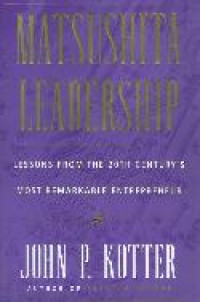
Matsushita leadership : lessons from the 20th century`s most remakable entrepreneur
| Gmd : Text
| Availability :
| 00000001010 | HC461.5 .M34K68 1997 | (General Book) | Available - Ada |
From Booklist
Two years before his death in 1989, Konosuke Matsushita was identified as one of the richest men in the world. When he died, the Japanese press bemoaned the loss of the "god of management." Matsushita built the business bearing his name into the world's largest consumer electronics company, turning out such familiar brands as Panasonic, Technics, and Quasar. He is also credited with establishing the Japanese system of paternal management, which offers lifetime employment. Rowland Gould and Michael Lombardi of the Success Motivation Institute of Japan produced the laudatory corporate history The Matsushita Phenomenon in 1970, but little English-language biographical material on Matsushita himself is available. Now Kotter, who happens to be the Konosuke Matsushita Professor of Leadership at the Harvard Business School and the noted author of The New Rules (1994) and numerous other books on leadership and management, has written a thoroughly researched and illuminating portrait that shows its subject as not only a successful businessman but also a visionary humanitarian. David Rouse
From Kirkus Reviews
A singularly uncritical and sketchy briefing on Konosuke Matsushita from a Harvard Business School professor whose stated intention is to showcase his subject's extraordinary achievements as object lessons for those who aspire to leadership positions in any endeavor. Drawing mainly on archival material, Kotter (coauthor of Corporate Culture and Performance, 1992) provides a once-over- lightly rundown on how the youngest son of an impoverished family from the Japanese hinterland overcame great adversity to found Osaka-based Matsushita Electric, a transnational corporation (best known in the US for its Panasonic line of consumer goods). After working as a wiring specialist for a public utility, Matsushita (who died at 94 in 1989) went into business for himself in 1917, manufacturing sockets, and hit the sales jackpot five years later with a cheap, reliable bicycle lamp. The still young entrepreneur soon diversified into batteries, radios, and allied products, becoming a commercial force in his homeland's wholesale and retail markets. Kotter all but ignores the thriving company's presumably significant contributions to Japan's WW II effort. After V-J Day, all companies that had supplied the military were ordered by occupation forces to cease production; but quickly receiving approval to resume production of consumer goods, Matsushita Electric recovered apace, expanding its sales horizons to encompass Europe and North America. The author touches without dwelling on the factors that powered the company's postwar growth (inter alia, decentralized management, a willingness to run calculated risks, government restrictions designed to keep foreign rivals out of domestic outlets, and an effective R&D program). Unfortunately, Kotter seldom comes to close grips with the personal qualities that enabled the competitive and demanding entrepreneur to build a world-class industrial enterprise that continues to prosper long after his departure. A bio that verges on hagiography and lacks the saving grace of practicable precepts. -- Copyright ?1997, Kirkus Associates, LP. All rights reserved.
Book Description
He was one of the most inspirational role models of all time. Thrown into poverty at age four, Konosuke Matsushita (Mat-SOSH-ta) struggled with the early deaths of family members, an apprenticeship which demanded sixteen-hour days at age nine, all the problems associated with starting a business with neither money nor connections, the death of his only son, the Great Depression, the horror of World War II in Japan, and more. Yet John P. Kotter shows in this fascinating and instructive book how, instead of being ground down by these hardships, Matsushita grew to be a fabulously successful entrepreneur and business leader, the founder of Japan's General Electric: the $65 billion a year Matsushita Electric Corporation.
His accomplishments as a leader, author, educator, philanthropist, and management innovator are astonishing, and outshine even Soichiro Honda, J.C. Penney, Sam Walton, and Henry Ford. In this immensely readable book, Kotter relates how Matsushita created a large business, invented management practices that are increasingly being used today, helped lead his country's economic miracle after World War II wrote dozens of books in his latter years, founded a graduate school of leadership, created Japan's version of a Nobel Prize, and gave away hundreds of millions to good causes.
The Matsushita story expands our notion of the possible, even for a sickly youngster who did not have the benefit of a privileged background, education, good looks, or a charismatic presence. It tells us much about leadership, entrepreneurship, a drive for lifelong learning, and their roots. It demonstrates the power of a longterm outlook, idealistic goals, and humility in the face of great success.
Matsushita Leadership is both a biography and a set of lessons for careers and corporations in the 21st century. An inspirational story and a business primer, the implications are powerful, for organizations and for living a meaningful life.
Ingram
Profiles Konosuke Matsushita, the Japanese entrepreneur who founded the $73 billion Matsushita Electric Company and whose vision of the manufacturer is that it should create wealth for society as well as shareholders and work to alleviate poverty. 25,000 first printing.
Book Info
Tells the story of Matsushita, who built a successful business enterprise in Japan in spite of facing many hardships. This book is both a biography and a set of lessons for careers and corporations in the 21st century. DLC: Matsushita, Konosuke, 1894 - 1989.
(Source : amazon.com)
| Series Title |
-
|
|---|---|
| Call Number |
HC461.5 .M34K68 1997
|
| Publisher Place | New York |
| Collation |
xiii, 302p.; 25cm.
|
| Language |
English
|
| ISBN/ISSN |
068483460X
|
| Classification |
HC
|
| Media Type |
-
|
|---|---|
| Carrier Type |
-
|
| Edition |
-
|
| Subject(s) | |
| Specific Info |
-
|
| Statement |
-
|
| Content Type |
-
|
No other version available







